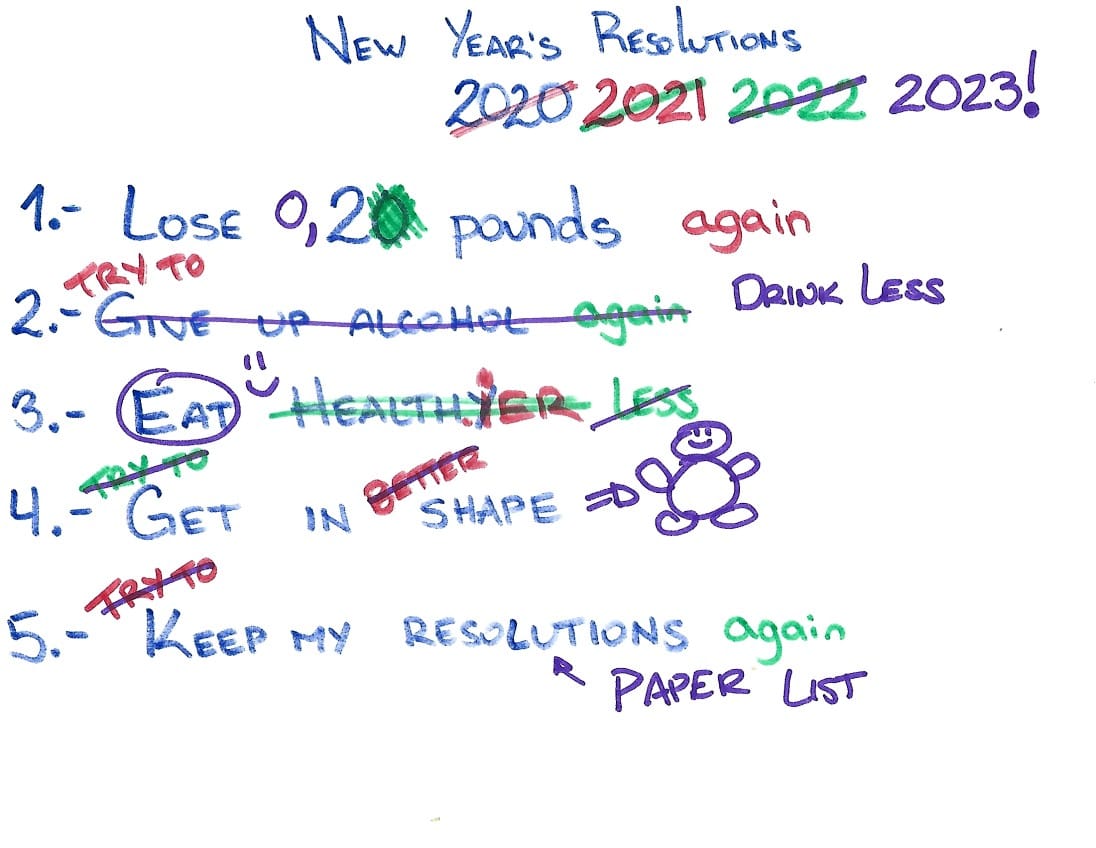Did you write your New Year’s Resolutions again? Does it look eerily similar to previous year? I’m not trying to make you feel bad, the truth is that many people fail their resolutions year after year. Depending on who do you ask, the failure rate is painful to look at. Some estimates say that one in three people fail their New Year’s resolutions in the first month. And only 10% of people are successful at keeping their resolutions throughout the year. According to a study by the University of Scranton, an estimated 80% of people don’t stick to their resolutions (Link). Statistics are so bad, that there is even an unofficial “Quitters’ Day” (Second Friday in January) and a “Ditch New Year’s Resolutions Day” (January 17th every year). So you are definitely not alone. The good news is that it doesn’t have to be the same this year!
Let’s take a look at some of the reasons most people fail their New Year’s resolutions and then check some strategies to ensure you don’t fall part of those ugly statistics
First: Unrealistic Expectations

Anything seems possible on January 1st, but don’t fall into the trap of setting a goal so hard that you are more likely to fail than achieve it. For example, running a marathon under 4 hours is a great goal, but if you have never run more than 5 mins straight and you are out of shape, then the likelihood of achieving this goal is not too high. The consequence, you will grow frustrated and will give up rather sooner than later.
So how to avoid it? Choose smaller, more relevant goals that will eventually lead you to the bigger goal. For example, set the goal of running 3 times a week. Once you are comfortable with this, the next goal can be running a 5k. Then a 10k. Then complete a Half Marathon, and so on.
Second: Unmeasurable Goals
Getting in shape is a great goal, but its rather vague. What is being in shape? How to measure it? If you cannot define the goal specifically and you don’t have a way of keeping tabs, then you are more likely to fail it. A common acronym for goals is SMART: Specific, Measurable, Achievable, Relevant and Time-Bound. If your goal follows these characteristics, you have the first hand in being successful.
In the example, instead of Getting in Shape, a SMART goal could be: Reduce One pant size by that summer vacation.
Third: Not Being Connected

One of the most common goals these days is Losing Weight. Part of it is because of the high percentage of medical obesity that exists in modern society. However, to be absolutely honest, not every one needs to lose weight. This is just what everyone else wants, but not necessarily what you personally want, or need. You may think I’m crazy, this is a personal trainer telling me that I don’t need to lose weight. But bear with me for a moment. Most of the people think they need to lose weight, because they imagine that it will make them feel happy. If I lose weight, everyone will like me, I will fit society’s standards of beauty and all will be rainbows and unicorns. But now think about it again, it is not the weight, it is how you will feel after you lose that weight.
Now, I want you to really think why do you want each of those goals, and make sure that it is because you really want them, not because society, your parents, your spouse or anyone else tells you. Choose a goal that you really want for you. Perhaps you don’t want to lose weight, but instead you want to feel healthier, been able to run behind your kids and not be exhausted. Or perhaps you want to feel “accepted” in the group you are surrounded by. Neither one of those is really achievable by Losing Weight. So changing the goal will make it more personal and you will stick to it.
Fourth: Not Having a Plan

Making up the plan as you go is a recipe for failure. Things will not magically change unless you make it happen. Remember that Einstein saying? “Insanity is doing the same thing over and over and expecting a different result” (Fun fact: Einstein apparently never said this, but I disgress). We cannot expect to achieve our goals if we don’t really have a plan to make it happen. One common example of this is “Give up alcohol” (Or smoking, or any other vice). This a habit that is deeply ingrained in our person, in the things we are accustomed to do, in the people we are surrounded by. In order to make it happen, we need to be ready to break those habits and create new ones.
One of the most important things we need to learn to break or create a habit, is what is commonly known as the “habit loop”. Any habit can be broken down into three parts: A trigger or cue, a routine or action and reward. Following the example of Giving up smoking, the trigger might be “I’m tired”, the action is “I smoke a cigarrette” and the reward “I feel energized”. Or maybe the trigger is “I’m stressed” and the reward is “I’m relaxed”. What we need to do is to set up a plan to break this loop. Next time you are tired, instead of going for the cigarrette, replace the stimulus with coffee, for example. Or if it is stress, then change it for an infusion, or a walk outside. I know, it’s easier said than done, but that’s exactly why you need to make a plan!
Fifth: Your friends

This is probably the hardest of all, but it is quite likely that part of the problem are your friends (Or some of them). And no, you are not getting off the hook, ultimately they are your goals, not theirs. But surrounding yourself by an environment that is pushing you to fail doesn’t help. Let’s say you want to quit drinking, but your crew goes for happy hour every Friday. Or you want to quit smoking, but all your coworkers smoke and it is part of the “culture” in the office.
One thing you need to do is remember you are the boss of your life. Don’t let others push you where you don’t want to go. Change those Friday happy hours for a breakfast and a walk in the park with your friends. You’ll still hang out with them, but the bad influence to drink will not be there. Let everyone know why this is important to you and ask them for their support. If they make fun or try to get you into the bad habit loop, then perhaps you need new friends. And that is another part of changing your habit, surround yourself of likeminded people. Why do you think that AA is efficient? Because all of them have similar goals and keep each other in check. So join a Facebook group, get a personal trainer (wink wink), recruit some of your friends to join you, etc.
Sixth: Don’t be so Hard on Yourself

Perhaps the most important of all. Stop beating yourself up! It won’t take you anywhere and will most likely cause you to end up even worse than you started. Instead remember the proverb “For the righteous one may fall seven times, and he will get up again”. Yes, we will fail sometimes, but it is more important to get up again and keep trying. And no, this is not an excuse to fall 5 times a day, it is the realization that your New Year resolutions don’t need to be tied to January 1st. If you fail in February, then you are better starting again right then than waiting a whole year of bad habits. And again, don’t beat yourself up. Be kind to you and learn from your mistake. Instead of saying “My legs are SO sore. I can’t possibly workout today”, say “Of course my muscles are sore. They’re supposed to be. It will get easier.” Make it positive and encouraging, like you would encourage your child to keep trying those math problems until they learn them.

Yes, this is going to be the best year of your life. If you just put these tips into practice, nothing can stop you from being a better version of yourself. And remember that all actions are compounded. One step by itself may seem small, but when you put all these together, they have inmense power and can take you anywhere. You can do this, I’m here rooting for you.




